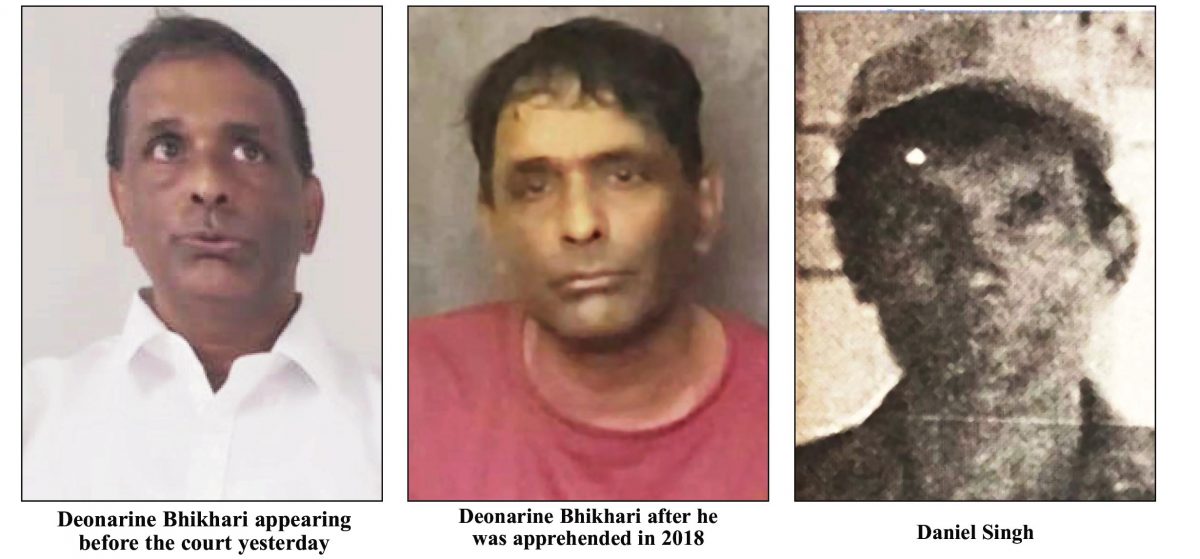Deonarine Bhikhari who murdered an Enmore father of four, Daniel Singh, in 2000 was yesterday sentenced to life imprisonment and will have to serve 30 years before becoming eligible for parole.
Twenty-three years after witnessing the murder of their father, Roopan and Deochan Singh told the High Court that they live, still haunted by the savagery meted out to their family.
While hailing the justice they said they have waited for for more than two decades and their confidence in the judicial system, the two who were just 12 and 10 years old at the time, said that the events of the fateful day of May 21st, 2000 remain etched in their memory.
Their victim impact statements were presented yesterday morning at the sentencing hearing of their father’s killer, who after the murder, had fled to neighbouring Venezuela where he remained a fugitive for some 18 years.
Following the conclusion of a trial on March 16th, a jury unanimously convicted Bhikhari of the capital offence.
He was sentenced to life in prison and must spend a minimum of 30 years before being eligible for parole.
On Sunday, May 21st, 2000; Bhikhari called Deo launched a vicious attack on Daniel Singh whom he fatally chopped; also injuring the man’s daughter with whom he claimed to have been in a relationship.
The family dogs were not spared and were also injured during Bhikhari’s rampage which saw the young Roopan and Deochan along with their other sibling—Hansraj—also scampering for safety.
Notwithstanding probation and prison reports which described the accused as a model citizen, Justice Jo-Ann Barlow likened the cruelty he visited upon the Singh family as that of a “brutish beast.”
She said the evidence showed that for reasons best known only to Bhikhari, not even the family’s pets were spared his vicious attack.
The judge then lamented the injuries suffered by the dead man’s daughter, with whom her father’s killer claimed to have been in a relationship.
Justice Barlow said that the circumstances of the crime warranted Bhikhari being visited with a sentence of life in prison; even as she underscored his refusal to take responsibility for what he had done.
Specifically referencing his lack of remorse, the judge noted that Bhikhari never once took responsibility for his actions; but rather sought to “lay blame at everyone’s door step, except his own.”
The judge said that the impact of the loss to the family remains evident, and to this end she urged Prosecutor Konyo Sandiford that notwithstanding the decades passed, to use her office to facilitate counselling.
In imposing the life sentence, Justice Barlow ordered that the offender is to spend at least 30 years before becoming eligible for parole. Further, she ordered that he enlists in the prison’s behaviour modification programmes; including, but not limited to anger management.
In their impact statements read by Prosecutor Sandiford, Roopan and Deochan memorialised their father as a “peaceful and kind-hearted” man who they said tried always to instil the best values in them while ensuring that his family was well taken care of.
The men said that while they were able to forge ahead and build productive lives they believe their father would be proud of today, his death has left a void which they said has impeded them achieving their full potential.
They spoke of being separated as siblings soon after their father’s death, and also having to leave school early.
The court heard from Deochan’s impact statement that it was the goodwill of persons who saw him through the most difficult of periods in his formative years, after his father died.
He said that now that himself, Roopan and their sister have children and families of their own, they wish they could share those joys with their father; but that in their quest to honour him, seek to instil in their own children, the virtues their father taught them.
When he was given a chance to address the court, the offender sought only to advance a claim that the evidence showed a “conspiracy.”
His lawyer Nirvan Singh said that his client had no antecedents and had begged the judge for leniency, but the Court was unmoved by his plea in mitigation and subsequently imposed the life sentence.
One of Singh’s sons, who was 12 at the time of the incident, had told this newspaper in May 2000 that around 5 am on the fateful day he and his younger brother were awoken by a loud commotion. The boy had related that when he peeked through the window he saw the attacker, wearing just his underwear, hacking away with a cutlass at his father. After brutally attacking Singh, the man turned his attention to the three dogs that were barking in the yard and killed them. Singh’s daughter, who also witnessed the attack, was screaming at the man before he started to attack her too. The girl was chopped on her hands twice and only managed to escape from more serious injuries after she and her siblings ran to a bedroom and locked the door.
The attacker fled from the house, scaled a fence and escaped.
Neighbours who were awakened by the loud noise rushed to the house where they found Singh with several chops about his body on the ground, the three dead dogs and the children locked in their room. They were then rushed to the hospital where girl was treated for her wounds. Singh was also taken to the hospital but did not regain consciousness and died several days after.






